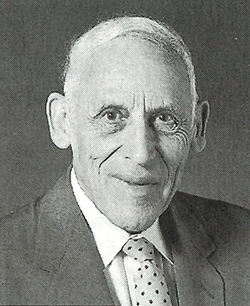J. Hans Lehmann, 1912-1996
 J. Hans Lehmann, who fled Nazi Germany in the 1930s and went on to serve as a faculty member and regent at the University of Washington, died March 31, 1996. He was 84 when he died of heart failure at his Ballard home.
J. Hans Lehmann, who fled Nazi Germany in the 1930s and went on to serve as a faculty member and regent at the University of Washington, died March 31, 1996. He was 84 when he died of heart failure at his Ballard home.
Lehmann, who lost most of his family in the Holocaust, was described by his friends as a Renaissance man, equally adept making a house call or discussing Mozart. A Seattle cardiologist for more than 40 years, he was a major force in the local arts and music scene.
“He was a man of immense breadth and depth,” said his close friend, UW President Emeritus William P. Gerberding. “He was brilliant.”
Lehmann played a vital role in encouraging Seattle physicians to accept the UW’s decision to build a medical school in the 1940s, Gerberding said, and worked behind the scenes to help save the UW humanities and arts departments from major budget cuts in the early 1980s. He argued that proposed cuts in those areas would have hurt “all the features that make us distinguished,” he said in 1981. “If they are eliminated, we might as well call ourselves Ballard Community College.”
It was no idle talk, either. Lehmann was a man who put his money where his mouth was, donating $250,000 to help fund the Robert A. Bruce Chair in Cardiology in the UW School of Medicine and another $250,000 to create the Hans and Thelma Lehmann Professorship in Music.
Born to a farm family in the northern Germany town of Barsinghausen, he fled Nazi Germany at the age of 24 and finished his schooling in medicine in Italy before coming to the United States, eventually landing in Seattle. He met his wife, Thelma Gerstman, in Seattle and the two were married in 1942. They had two sons.
A physician specializing in internal medicine and cardiology, he joined the clinical faculty of the School of Medicine in 1950. He spoke several languages and wrote two books—one on his experience emigrating from Germany, another on Seattle’s cultural evolution.
“His brain was going a mile a minute,” says close friend Milton Katims. “In fact, it was going so fast he couldn’t get the words out to keep up. They weren’t always in synch.”
He also helped found the Seattle Opera Association and the Pacific Northwest Ballet Association, and served on the boards of many other organizations. He was appointed as a regent in 1977 by Gov. Dixy Lee Ray and served until 1983.
An avid mountain skier and mountaineer—”I climbed every mountain in the state of Washington, practically,” he said in 1983—he worked all over the world, serving on the hospital ship S.S. Hope, and teaching medicine in Africa, South America and Asia. He also supported the UW’s affiliation with a Saudi Arabian medical university in the early 1980s.